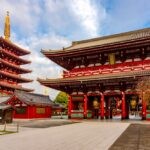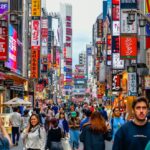Japan targets online casinos and celebrity endorsements via new law

A Japanese law to curb gambling addiction came into force on September 25, placing greater restrictions on illegal online gambling.
Under the revised law, which was passed by parliament in June, online casinos will be banned from launching or advertising themselves on social media platforms or YouTube in Japan.
The law also requires national and local governments to do more to raise awareness about the potential dangers of online gambling. The push for tighter restrictions came from a National Police Agency survey, which found that around 3.4 million Japanese residents gambled online.
During a gambling addiction conference held in Tokyo last weekend, the president of Japanese media conglomerate The Yomiuri Shimbun Holdings, Toshikazu Yamaguchi, argued that JPY6.5 trillion (US$43.5 billion)1 JPY = 0.0067 USD
2025-09-26Powered by CMG CurrenShift was gambled each year on offshore sites.
The new rules will also target celebrity endorsements of online gambling after a slew of high-profile indictments, including six comedians and a member of the boy band JO1.
Currently, the only legal types of gambling in Japan are horse racing, sports betting, and pachinko – a Japanese arcade game similar to pinball.
Charlotte Capewell brings her passion for storytelling and expertise in writing, researching, and the gambling industry to every article she writes. Her specialties include the US gambling industry, regulator legislation, igaming, and more.
Verticals:
Sectors:
Topics:
Dig Deeper
The Backstory
What set the crackdown in motion
Japan’s latest move against illegal online gambling is the product of mounting pressure on multiple fronts: rising participation, headline-grabbing scandals and a widening gap between domestic law and cross-border platforms. A National Police Agency survey has repeatedly underscored the scale of the problem, with officials estimating more than three million people have wagered online. The police have leaned on platforms to remove content and warned consumers through public campaigns. For background on the agency and its remit, see the National Police Agency’s English site at npa.go.jp.
Lawmakers tightened policy in stages. In June, parliament approved amendments to Japan’s gambling addiction countermeasures law that explicitly outlaw operating or promoting offshore online casinos to residents, enabling internet providers and platforms to remove content before harm spreads. The overhaul was framed around prevention and awareness, not criminal penalties, but it gave regulators a clearer lever on the ad and affiliate ecosystem. The ban on steering users to foreign casinos is detailed in our coverage of Japan’s new advertising prohibition on overseas online casinos.
By September, the government activated the revised framework with a broader push to curb online gambling addiction, adding limits on how operators market on social media and video platforms and calling for more public education. Read how the revised law targets platforms and endorsements in Japan’s updated gambling addiction law now in force.
Enforcement pivots from ads to access
With ads increasingly constrained, authorities turned to the harder task: cross-border access. In practice, many unlawful sites target Japan in its own language and accept local traffic while operating under foreign licenses, a jurisdictional mismatch that complicates prosecution at home. Tokyo has asked regulators in key licensing hubs to help. As reported in our piece on the diplomatic push, the government sought cooperation from Canada, Costa Rica, Malta and Georgia, along with the Isle of Man, Gibraltar and Anjouan in the Comoros. The aim is to deter Japan-facing operations and their payment pipelines before they reach the domestic market. See the full list of jurisdictions in Japan’s request that other countries block casino access.
The strategy recognizes that enforcement must follow the money and the intermediaries. Domestic powers remain limited when sites sit abroad, so Japan has targeted affiliates, ranking sites, influencers and payment agents who steer or enable local bettors. The recent ad prohibition, which covers banner placements, ranking and recommendation pages and social media posts linking to offshore casinos, gives platforms a pretext to remove these vectors quickly. The Internet Hotline Center, which collaborates with the police, is expected to fast-track takedown requests, as outlined in our advertising ban coverage.
A public health framing, and high-profile flashpoints
Officials have anchored the crackdown in addiction policy, not only criminal law. That framing gained visibility at a Japan-U.K. conference in Tokyo, where researchers, advocates and families pressed for stronger support systems and prevention measures, and industry voices highlighted the scale of offshore sports betting. Attendees urged Japan to follow international best practices to curb manipulation and addiction risk. A recap of the event is in our report on the Japan-U.K. gambling addiction conference in Tokyo.
The political optics also shifted after a string of celebrity cases tied to illegal wagering. The revised law explicitly targets endorsements and promotional ties between entertainers and casino sites, reflecting concerns that celebrity-led campaigns normalize risk and boost youth exposure on social media. The expanded restrictions on endorsements and platform promotion are detailed in our coverage of the law’s rollout.
The conference also spotlighted integrity in sports. Speakers referenced European measures to combat match-fixing, including calls for Japan to align with the Council of Europe’s Macolin Convention on the manipulation of sports competitions. While Japan has not adopted that convention, the discussion signals a shift toward international norms where safeguarding competitions and tackling addiction are treated as overlapping policy goals.
Global playbook: bans, licensing and targeted takedowns
Japan is not acting in isolation. Jurisdictions are testing different levers to curb harms from illegal or unregulated online gambling. India has chosen a sweeping approach. Parliament passed the Promotion and Regulation of Online Gaming Bill, a near-blanket ban on many iGaming formats such as card games, poker and fantasy sports, paired with penalties for operators and promoters. It carves out exemptions for esports and educational games to protect parts of the digital economy. Read our analysis in India’s law banning most iGaming platforms.
U.S. state regulators have favored targeted enforcement within a licensed market. The Michigan Gaming Control Board recently issued cease-and-desist orders to two Panama-based sites accused of taking bets without authorization, accepting credit cards and cryptocurrency, and offering a wide array of wagers. The action underscores how license-first regimes use consumer-protection arguments and payment scrutiny to constrain offshore operators. Details are in Michigan’s cease-and-desist orders against Panama-based operators.
Japan’s hybrid path—curbing promotion and endorsements at home while seeking cooperation abroad—sits between India’s prohibition-led model and the U.S. emphasis on licensed alternatives backed by steady enforcement. The approach relies on two reinforcing channels: reducing demand through awareness and ad suppression, and constricting supply by leaning on foreign regulators and closing domestic marketing loopholes.
What to watch as policy meets practice
The next phase will test whether ad bans and diplomatic nudges translate into fewer Japan-facing options and lower conversion from social feeds to betting apps. Authorities have signaled more emphasis on payment flows and affiliate networks—areas where domestic jurisdiction is stronger. The revised law, coupled with planned takedown orders, could thin the visibility of offshore brands in Japanese search results and feeds. For details on the legal scaffolding now in place, see our report on the advertising amendments and our piece on the broader addiction countermeasures.
International coordination remains the swing factor. As our coverage of Japan’s outreach to foreign jurisdictions shows, many sites operate legally where they are licensed but target Japanese users through language localization and aggressive SEO. If regulators in those hubs tighten conditions—for example, restricting Japan-facing marketing or requiring geoblocking—Tokyo’s efforts will gain traction. Absent that, enforcement will focus on local intermediaries and consumer warnings. Ongoing data from the police and the Internet Hotline Center, posted through official channels like npa.go.jp, will indicate whether prevalence rates recede.
Stakes are high for media platforms, celebrities and payment companies. Platforms may be pressed to expand proactive removals. Talent agencies will likely reevaluate contracts tied to gambling. Payment processors could face heightened scrutiny when transactions trace back to known offshore brands. The policy trajectory suggests more alignment with international integrity standards, including elements of the Macolin Convention, as sports betting remains a focal point of both addiction risks and competition manipulation. The government’s challenge is to balance consumer protection with transparent rules for legal betting segments, including horseracing, authorized sports wagering and pachinko, while turning down the volume on illegal markets that have grown in an algorithm-driven era.








